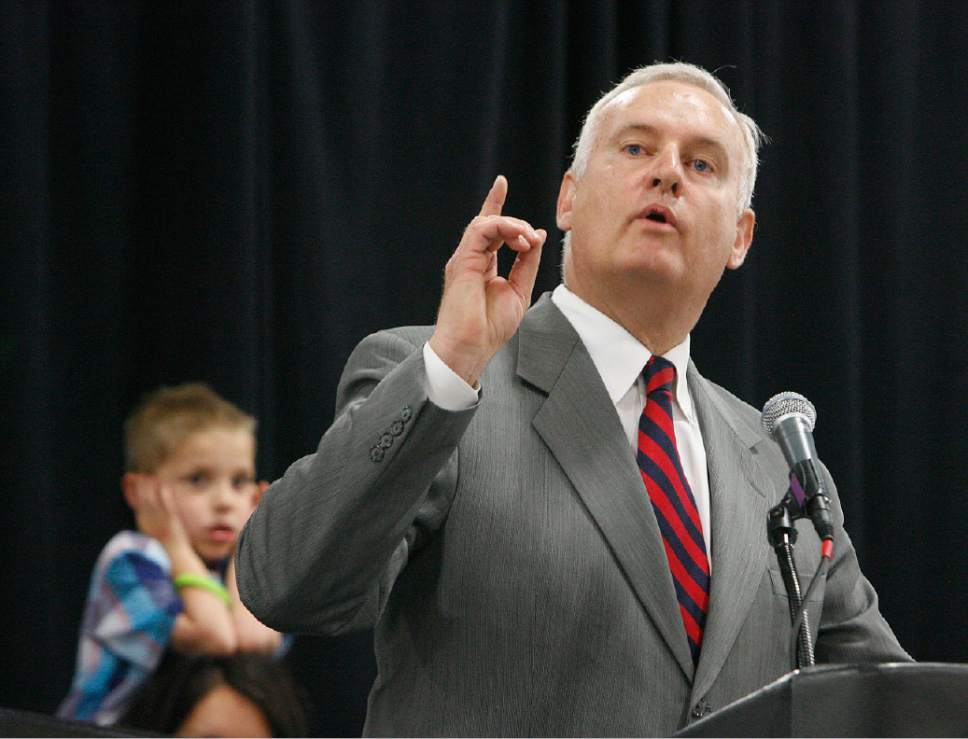This is an archived article that was published on sltrib.com in 2016, and information in the article may be outdated. It is provided only for personal research purposes and may not be reprinted.
Three Salt Lake County Council members said Tuesday they are prepared to pursue punitive actions against Utah Transit Authority if it doesn't reverse its decision to close board committee meetings to the public.
Republican Councilman Richard Snelgrove took the lead, saying that "in the days ahead" he would prepare a proposal for the county to block the pass-through of $150 million in sales-tax revenue from the state to UTA to emphasize the council's commitment to openness and transparency.
He received wholehearted support from Republican Steve DeBry, who said he favored "finding ways to remind UTA of our shared duty to the public. That duty includes taking public input."
Democratic Councilwoman Jenny Wilson went on to say she is involved in conversations about legislation to change the governance of UTA because the current system "doesn't seem to be working."
UTA spokesman Remi Barron said late Tuesday that board chairman H. David Burton was out of town and unavailable. Barron had no other comment, and referred to a letter Burton sent Friday to UTA stakeholders, including Salt Lake County officials, about the agency's decision to close the meetings of three previously open subcommittees to the public.
UTA officials had acknowledged that closure May 10, the day before committee meetings where much of the work is done on issues before they advance to the full board. The agency has pledged more public participation in the final decision making at full board meetings, including posting agendas and board information packets on the UTA website in advance of meetings, holding public-comment periods at meetings and, perhaps, live streaming of board sessions.
Initially, Barron said recent reforms to make UTA more transparent had reduced the committee meetings to informal work sessions not required to be open. Besides, he added, the meetings were poorly attended. Three days later, after addressing the Utah Transportation Commission, Burton told Tribune reporter Lee Davidson that his critical coverage of the agency actually was to blame for the meeting closures.
"You really want to know the truth?" Burton said in a tape-recorded hallway interview. "Because you screw us up."
He also said that it was "intolerable" that most UTA board members were learning about upcoming proposals from The Tribune rather than through communications from committees.
Media attorney Jeff Hunt, told The Tribune that Utah's Public and Open Meetings Act clearly covers advisory committees and UTA's action would violate the law.
At Tuesday's County Council meeting, in a portion of the agenda where members can talk about whatever they want, Snelgrove said he was "troubled" when he first read of the meeting closures.
"I have always felt strongly about the need for openness and transparency regarding how the public's business is being conducted and how their money is being spent," said Snelgrove, an at-large councilman since 2010 and former chairman of the Utah Republican Party.
He expressed those feelings in a May 10 Facebook post.
"Unbelievable," he wrote. "UTA wonders why they don't have the public confidence & then they pull a stunt like this. Part of the cure for UTA is more openness and transparency, not less. UTA wants public money but apparently doesn't want public scrutiny on how the public money is spent. The public has a right to know!"
He said Burton's explanation made matters worse. "The letter merely defended them. This lack of openness and transparency at UTA is unacceptable."
DeBry concurred. "If transparency screws you up," he said, playing on Burton's words to Davidson, "transparency isn't the problem. Whatever UTA's problems are with the media, the public has a right to know what they're [UTA officials] doing with their [taxpayers'] money."
Scrutiny of UTA is both desirable and deserved, DeBry added, saying last fall's sound defeat of Proposition 1 by Salt Lake County voters was the public expressing "we don't trust UTA as stewards of our money. That message should sting."
Consequently, he felt the council has a "fiduciary duty to make sure taxes levied for Salt Lake County or UTA are appropriately spent."
Wilson said she is watching closely to see what UTA does in selecting a new chief executive to replace the retired Mike Allegra and taking actions to re-establish public trust.
"All of us had concerns and continue to have concerns," she said. "A demonstrable commitment to public engagement is near the top, if not at the top, of the list."
With the creation of five new townships changing the county's role on many multi-agency boards, Wilson suggested now might be a good time to work with the Legislature on changing UTA's leadership structure, adding an oversight committee and a new system of governance.
"Some members of the [current UTA] board seem committed" to openness, she said, "but collectively we haven't seen what we need to see."
No formal action was taken.



